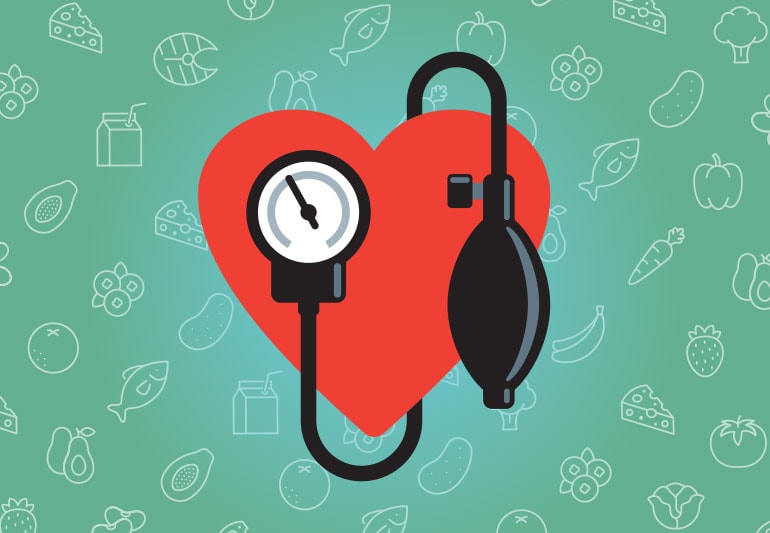The Influence Of Diet On Blood Pressure And Heart Health

Cardiovascular disease remains one of the leading causes of death worldwide, with high blood pressure being a significant risk factor. While genetics and lifestyle factors like smoking and physical activity play a role in the development of hypertension, the link between diet and blood pressure has become increasingly evident.
A diet rich in fruits, vegetables, whole grains, and lean protein has been found to lower blood pressure and reduce the risk of heart disease. Conversely, consuming a diet high in sodium, saturated and trans fats, and added sugars has been found to increase blood pressure and the risk of heart disease.
This article aims to explore the influence of diet on blood pressure and heart health. We will begin by discussing the link between diet and cardiovascular health, with a focus on understanding blood pressure and its role in heart health. We will then delve into the importance of a balanced diet for lowering blood pressure and discuss foods to avoid for improved heart health.
Additionally, we will provide practical advice on incorporating heart-healthy foods into your diet and highlight the benefits of exercise for a healthy heart. Finally, we will explore how lifestyle changes, including diet and exercise, can help manage heart disease and create a sustainable, heart-healthy lifestyle.
Key Takeaways
- A diet rich in fruits, vegetables, whole grains, and lean protein can significantly lower blood pressure and reduce the risk of heart disease.
- Consuming a diet high in sodium, saturated and trans fats, and added sugars can increase blood pressure and the risk of heart disease.
- The Mediterranean diet and DASH diet have been associated with a reduced risk of developing cardiovascular disease.
- Regular exercise, stress management, and avoiding harmful habits like smoking and excessive alcohol consumption are crucial for managing and preventing heart disease.
The Link Between Diet and Cardiovascular Health
The relationship between dietary patterns and cardiovascular health has been extensively investigated, with evidence suggesting that diets high in fruits, vegetables, whole grains, and lean proteins may be protective against cardiovascular disease. Conversely, diets high in saturated and trans fats, added sugars, and sodium have been associated with an increased risk of developing cardiovascular disease.
The Mediterranean diet, for instance, has been shown to have a protective effect on cardiovascular health. This diet is rich in fruits, vegetables, whole grains, fish, and olive oil, and low in red and processed meats, dairy products, and sweets. Studies have found that adherence to the Mediterranean diet is associated with a lower risk of heart disease, stroke, and overall mortality.
Similarly, the DASH (Dietary Approaches to Stop Hypertension) diet, which emphasizes fruits, vegetables, low-fat dairy products, whole grains, poultry, fish, and nuts and limits saturated and trans fats, red meat, and sweets, has also been associated with a reduced risk of developing hypertension and cardiovascular disease.
Understanding Blood Pressure and Its Role in Heart Health
Understanding the role of blood pressure in maintaining a healthy cardiovascular system is crucial for preventing various diseases.
Blood pressure is the force exerted by the blood against the walls of the arteries as it circulates through the body.
The normal blood pressure range is considered to be around 120/80 mmHg, where 120 mmHg represents the systolic pressure (pressure in the arteries when the heart beats) and 80 mmHg represents the diastolic pressure (pressure in the arteries when the heart is at rest).
High blood pressure (hypertension) is a common condition that can lead to various complications such as heart disease, stroke, kidney disease, and vision loss.
It is often referred to as a ‘silent killer’as it usually has no symptoms and can go unnoticed for years, causing damage to the arteries and organs.
Therefore, it is important to monitor blood pressure regularly and make lifestyle changes such as maintaining a healthy diet, exercising regularly, quitting smoking, and reducing stress to prevent or manage hypertension and maintain heart health.
The Importance of a Balanced Diet for Lowering Blood Pressure
Maintaining a healthy and balanced dietary intake is crucial for individuals who aim to promote optimal cardiovascular function. A balanced diet that is rich in fruits, vegetables, whole grains, lean proteins, and healthy fats has been shown to significantly lower blood pressure levels and reduce the risk of heart disease.
On the other hand, a diet that is high in sodium, saturated fats, and processed foods can lead to hypertension and other cardiovascular complications.
One of the key components of a heart-healthy diet is the intake of fruits and vegetables. These foods are rich in vitamins, minerals, and antioxidants that have been shown to reduce inflammation and improve blood vessel function.
Additionally, whole grains and lean proteins provide essential nutrients that are necessary for maintaining optimal cardiovascular health.
By eating a balanced diet that is low in sodium and saturated fats, individuals can significantly lower their blood pressure levels and reduce the risk of heart disease.
Foods to Avoid for Improved Heart Health
Consuming excessive amounts of processed foods, saturated fats, and high-sodium foods can have negative impacts on cardiovascular function. In order to maintain good heart health, it is important to be mindful of what we eat.
Here are four common foods that should be avoided for improved heart health:
- Processed meats: These include hot dogs, sausages, and deli meats. They are high in saturated fats and sodium, which can lead to high blood pressure and an increased risk of heart disease.
- Fried foods: Fried foods are often high in trans fats, which can increase LDL cholesterol levels and contribute to the buildup of plaque in the arteries.
- Sugary drinks: Beverages like soda and sports drinks are high in added sugars, which can increase the risk of obesity, type 2 diabetes, and heart disease.
- High-sodium foods: Foods that are high in sodium, such as canned soups and frozen dinners, can lead to water retention and high blood pressure. It is important to read nutrition labels and choose low-sodium options when possible.
By avoiding these foods and making healthy food choices, we can help improve our heart health and reduce the risk of heart disease. It is important to remember that a balanced diet, along with regular exercise and stress management, are key components to maintaining a healthy heart.
Incorporating Heart-Healthy Foods into Your Diet
Incorporating nutrient-dense foods into one’s daily meals can support cardiovascular wellness and improve overall well-being. These foods are packed with essential nutrients and are naturally low in sodium, saturated and trans fats, and added sugars. Consuming a balanced diet that includes plenty of fruits, vegetables, whole grains, lean proteins, and healthy fats has been linked to a reduced risk of heart disease, stroke, and high blood pressure.
Fruits and vegetables are particularly beneficial for promoting heart health. They are rich in vitamins, minerals, and fiber, and are low in calories. Berries, leafy greens, citrus fruits, and tomatoes are especially high in heart-healthy nutrients like vitamin C, potassium, and antioxidants.
Whole grains, such as brown rice, quinoa, and oatmeal, are another excellent source of fiber, which has been shown to reduce cholesterol levels. Lean proteins like fish, chicken, and legumes are also important for maintaining a healthy heart. Incorporating these foods into one’s diet can be a simple yet effective way to support cardiovascular wellness and live a healthier life.
The Benefits of Exercise for a Healthy Heart
Transition: A heart-healthy diet is essential for maintaining optimal blood pressure and reducing the risk of heart disease. In addition to incorporating heart-healthy foods into your diet, regular exercise is also beneficial for improving heart health.
Regular exercise has numerous benefits for maintaining a healthy heart. It helps to lower blood pressure, reduce inflammation, and improve blood flow. Exercise also helps to strengthen the heart muscle, making it more efficient at pumping blood. This can improve overall cardiovascular health and reduce the risk of heart attacks and stroke. Additionally, exercise can help to maintain a healthy weight, which is important for reducing the risk of heart disease.
Aim for at least 30 minutes of moderate-intensity exercise most days of the week to reap the benefits for your heart health.
Incorporating exercise into your daily routine can be easy and enjoyable. Find an activity that you enjoy, such as walking, swimming, or cycling, and try to do it regularly. You can also incorporate exercise into your daily routine by taking the stairs instead of the elevator or walking instead of driving for short distances.
Always talk to your doctor before starting a new exercise routine, especially if you have an existing health condition. With regular exercise and a heart-healthy diet, you can improve your heart health and reduce the risk of heart disease.
Managing Heart Disease Through Diet and Lifestyle Changes
One effective approach to managing heart disease involves making key adjustments to one’s daily routine and adopting healthy lifestyle habits. This includes changes in diet and exercise routines, as well as stress management techniques.
The following are key habits that can help manage heart disease:
- Eating a heart-healthy diet that is low in saturated and trans fats, cholesterol, and sodium, and high in fiber, whole grains, fruits, and vegetables.
- Engaging in regular exercise, including aerobic and strength training exercises, for at least 150 minutes per week.
- Managing stress through techniques such as deep breathing, meditation, yoga, or other relaxation practices.
- Avoiding smoking and secondhand smoke, as well as excessive alcohol consumption.
By adopting these habits, individuals can help manage heart disease and reduce the risk of further complications. It is important to work with a healthcare professional to develop a personalized plan for managing heart disease that takes into account individual needs and medical history.
Creating a Sustainable, Heart-Healthy Lifestyle
Developing sustainable lifestyle habits is a crucial aspect of managing and preventing heart disease, ensuring long-term cardiovascular health.
A heart-healthy lifestyle involves adopting a balanced diet, engaging in regular physical activity, managing stress, and avoiding harmful habits such as smoking and excessive alcohol consumption.
While making lifestyle changes may seem challenging, they can significantly improve heart health and reduce the risk of developing heart disease.
One of the most important aspects of a heart-healthy lifestyle is adopting a balanced diet that is low in saturated and trans fats, cholesterol, and sodium.
This can be achieved by incorporating plenty of fruits, vegetables, whole grains, lean proteins, and healthy fats, such as those found in nuts, seeds, and fatty fish.
Additionally, limiting the consumption of processed and packaged foods that are high in sugar, salt, and unhealthy fats can help reduce the risk of developing heart disease.
By making gradual and sustainable changes to one’s diet and lifestyle, individuals can significantly improve their overall health and well-being, leading to a healthier and happier life.
Conclusion
In conclusion, there is a clear link between diet and cardiovascular health. Understanding the role of blood pressure in heart health is key to making informed dietary choices.
Consuming a balanced diet rich in fruits, vegetables, whole grains, and lean protein can help lower blood pressure and reduce the risk of heart disease. Conversely, a diet high in sodium, saturated and trans fats, and added sugars can have a negative impact on heart health.
Incorporating heart-healthy foods into your diet and engaging in regular exercise can lead to significant improvements in cardiovascular health. Additionally, individuals with pre-existing heart disease can benefit from making dietary and lifestyle changes to better manage their condition.
By adopting a sustainable, heart-healthy lifestyle, individuals can reduce their risk of heart disease and improve their overall quality of life.









